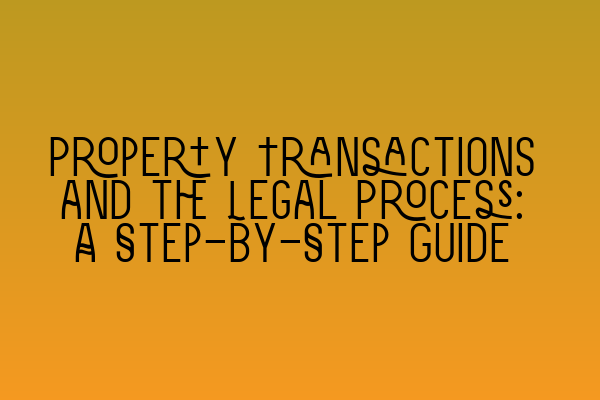Property Transactions and the Legal Process: A Step-by-Step Guide
Buying or selling a property is a significant milestone in anyone’s life. Whether you are a first-time buyer or a seasoned investor, understanding the legal process involved in property transactions is crucial. This step-by-step guide will provide you with a clear overview of the legal steps involved in a property transaction and help you navigate the process with confidence.
Step 1: Instructing a Solicitor
The first step in any property transaction is to instruct a solicitor who specializes in property law. Your solicitor will act on your behalf and handle all legal aspects of the transaction. They will ensure that your interests are protected and will guide you through the entire process.
SQE Preparation for Property Practice: Mapping Out Your Strategy
Step 2: Conducting Searches and Surveys
Once you have instructed a solicitor, they will carry out various searches to gather important information about the property. These searches may include local authority searches, environmental searches, and water and drainage searches. Additionally, a surveyor may be instructed to assess the condition and value of the property.
Step 3: Reviewing and Negotiating the Contract
After the searches and surveys have been completed, your solicitor will review the contract provided by the seller’s solicitor. They will ensure that all the necessary details are included and will negotiate any amendments or additional terms if required. It is crucial to have a thorough understanding of the contract to protect your interests.
Step 4: Exchanging Contracts
Once both parties have agreed on the terms of the contract, the next step is to exchange contracts. At this stage, the transaction becomes legally binding, and both parties are committed to completing the sale. A deposit is usually paid at this point, which is typically around 10% of the purchase price.
Step 5: Completion and Transfer of Ownership
The completion date is the day when the property officially changes ownership. On this day, the remaining balance of the purchase price is transferred to the seller’s solicitor, and the keys to the property are handed over to the buyer. Your solicitor will ensure that all necessary documents are signed, and the transfer of ownership is properly recorded.
Updates in UK Property Laws: Key Changes and Implications
Step 6: Registering the Property
After completion, your solicitor will register the property with the Land Registry. Registering the property guarantees your legal ownership and protects your interests. It is essential to ensure that your solicitor completes this step promptly to avoid any issues with ownership or future transactions.
Step 7: Post-Completion Matters
Once the property transaction is complete, there are a few post-completion matters that need to be addressed. These may include notifying utility companies of the change in ownership, arranging for buildings and contents insurance, and updating your address with relevant authorities and organizations.
Legal challenges in property transactions: A comprehensive guide
Conclusion
A property transaction can be a complex and time-consuming process. However, by understanding the step-by-step legal process involved, you can navigate it more confidently. Remember to always seek professional advice from a solicitor experienced in property law to ensure that your interests are protected throughout the transaction.
For more information on property law and related topics, check out these articles:
Navigating Lease Laws in the UK: Essential Guidelines for Tenants and Landlords
